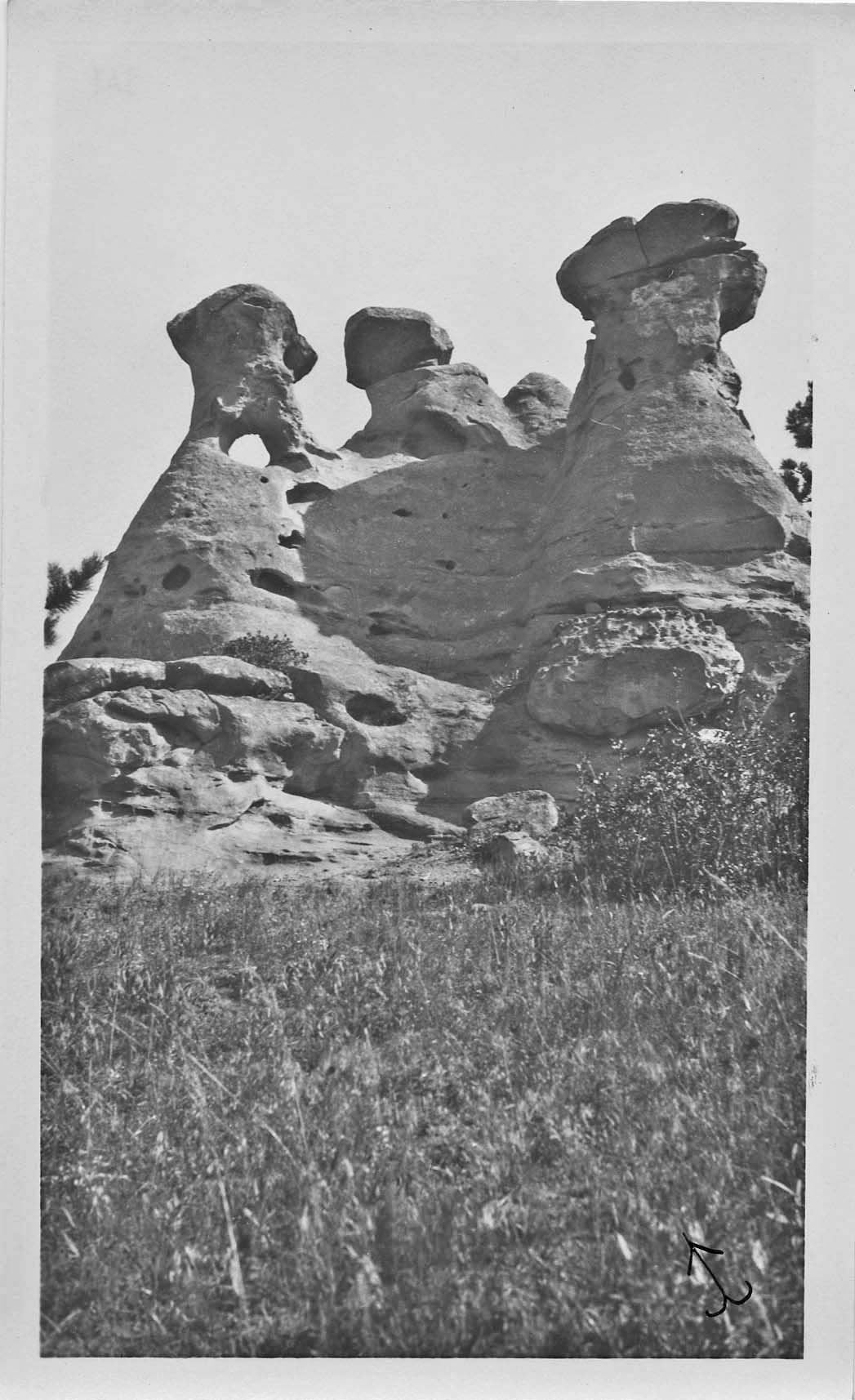Geologic Wonders
Aug 10, 2023 by Tempe Javitz
The western United States is full of famous geologic
sites, none more famous than the world’s first national
park, Yellowstone. In southeastern Montana near my
grandparent’s ranch on Rosebud Creek there were also
some amazing sandstone configurations. Sandstone, of
course, over time weathers and erodes.
Jessamine took a series of photos of the sandstone formation
locally known as “Camel Rock,” very close to the town of
Decker near the Wyoming border. The Camel Rock area was
large and covered quite a bit of ground. As a child it was always
exciting to look for the camel as we were driving towards
Sheridan. Jessamine’s photos show how substantial this rock
formation was.

Photo of Camel Rock in 1928.
.jpg)
The south side of "Sand Mountain", June 15,1924
Unfortunately, in the 1970s the Decker Coal Mine began a
surface mine in this area and in no time at all the Camel Rock
disappeared forever into the pit!
Just north of the X4 Ranch in Kirby is an area of sandstone
formations near Davis Creek. Jessamine titled her photos the
“Garden of the Gods”after a similar area in Colorado Springs
of highly unusual rock outcroppings. Unlike the Colorado
version, these sandstones are not so dramatic, yet interesting in
shape and form. The photos were taken in July 1927.
.jpg)
A tepee form, with a wonderful eye hole.
.jpg)
A fascinating row of eroded rocks.

My favorite, crenellated sandstones.
Not far down the road toward Busby, Montana from these
sandstones was the ranch of one of Jessamine’s favorite
Cheyenne friends, Laban Little Wolf. She took a photo in
1928 while walking the property. She called this “tepee rock”.
What I find interesting is that there is a tree growing out of the
rock. I wouldn’t be surprised if today it looks quite different
due to erosion and the force of tree roots.

The next time you are out hiking take notice of the amazing power of
erosion on the landscape around you.
For more stories and photos you may order my book at:
https://www.sdhspress.com/books/bighorn-visions
Cowboy Jargon:
Sand: A person with “sand” has courage and grit. A sand flat is an
arid and sandy stretch of flat country. The Sand Hills of Nebraska
is a region of grass stabilized sand dunes in north-central Nebraska,
which covers an amazing 19,300 square miles. The Blackfeet tribe of
Native Americans speak of their dead as having gone to the sand hills.
Dust Devil: A small whirlwind of sand.
Sand Wagon: A stagecoach that was specially built to cross rivers
that have quicksand. It was built with wide tires and high clearance.
Sand bur: A prickly part of several Western plants with spiky seedheads.
They prick and hurt you when touched.
Sandcast: This refers to jewelry made from molten silver poured into
a two-part mold carved from soft tufa or pumice blocks wired together.
Sandhill Crane: These huge and gangly gray birds inhabit marshes in the
West.
*Thanks again to google search and Win Blevins “Dictionary of the American
West.”
sites, none more famous than the world’s first national
park, Yellowstone. In southeastern Montana near my
grandparent’s ranch on Rosebud Creek there were also
some amazing sandstone configurations. Sandstone, of
course, over time weathers and erodes.
Jessamine took a series of photos of the sandstone formation
locally known as “Camel Rock,” very close to the town of
Decker near the Wyoming border. The Camel Rock area was
large and covered quite a bit of ground. As a child it was always
exciting to look for the camel as we were driving towards
Sheridan. Jessamine’s photos show how substantial this rock
formation was.

Photo of Camel Rock in 1928.
.jpg)
The south side of "Sand Mountain", June 15,1924
Unfortunately, in the 1970s the Decker Coal Mine began a
surface mine in this area and in no time at all the Camel Rock
disappeared forever into the pit!
Just north of the X4 Ranch in Kirby is an area of sandstone
formations near Davis Creek. Jessamine titled her photos the
“Garden of the Gods”after a similar area in Colorado Springs
of highly unusual rock outcroppings. Unlike the Colorado
version, these sandstones are not so dramatic, yet interesting in
shape and form. The photos were taken in July 1927.
.jpg)
A tepee form, with a wonderful eye hole.
.jpg)
A fascinating row of eroded rocks.

My favorite, crenellated sandstones.
Not far down the road toward Busby, Montana from these
sandstones was the ranch of one of Jessamine’s favorite
Cheyenne friends, Laban Little Wolf. She took a photo in
1928 while walking the property. She called this “tepee rock”.
What I find interesting is that there is a tree growing out of the
rock. I wouldn’t be surprised if today it looks quite different
due to erosion and the force of tree roots.

The next time you are out hiking take notice of the amazing power of
erosion on the landscape around you.
For more stories and photos you may order my book at:
https://www.sdhspress.com/books/bighorn-visions
Cowboy Jargon:
Sand: A person with “sand” has courage and grit. A sand flat is an
arid and sandy stretch of flat country. The Sand Hills of Nebraska
is a region of grass stabilized sand dunes in north-central Nebraska,
which covers an amazing 19,300 square miles. The Blackfeet tribe of
Native Americans speak of their dead as having gone to the sand hills.
Dust Devil: A small whirlwind of sand.
Sand Wagon: A stagecoach that was specially built to cross rivers
that have quicksand. It was built with wide tires and high clearance.
Sand bur: A prickly part of several Western plants with spiky seedheads.
They prick and hurt you when touched.
Sandcast: This refers to jewelry made from molten silver poured into
a two-part mold carved from soft tufa or pumice blocks wired together.
Sandhill Crane: These huge and gangly gray birds inhabit marshes in the
West.
*Thanks again to google search and Win Blevins “Dictionary of the American
West.”
